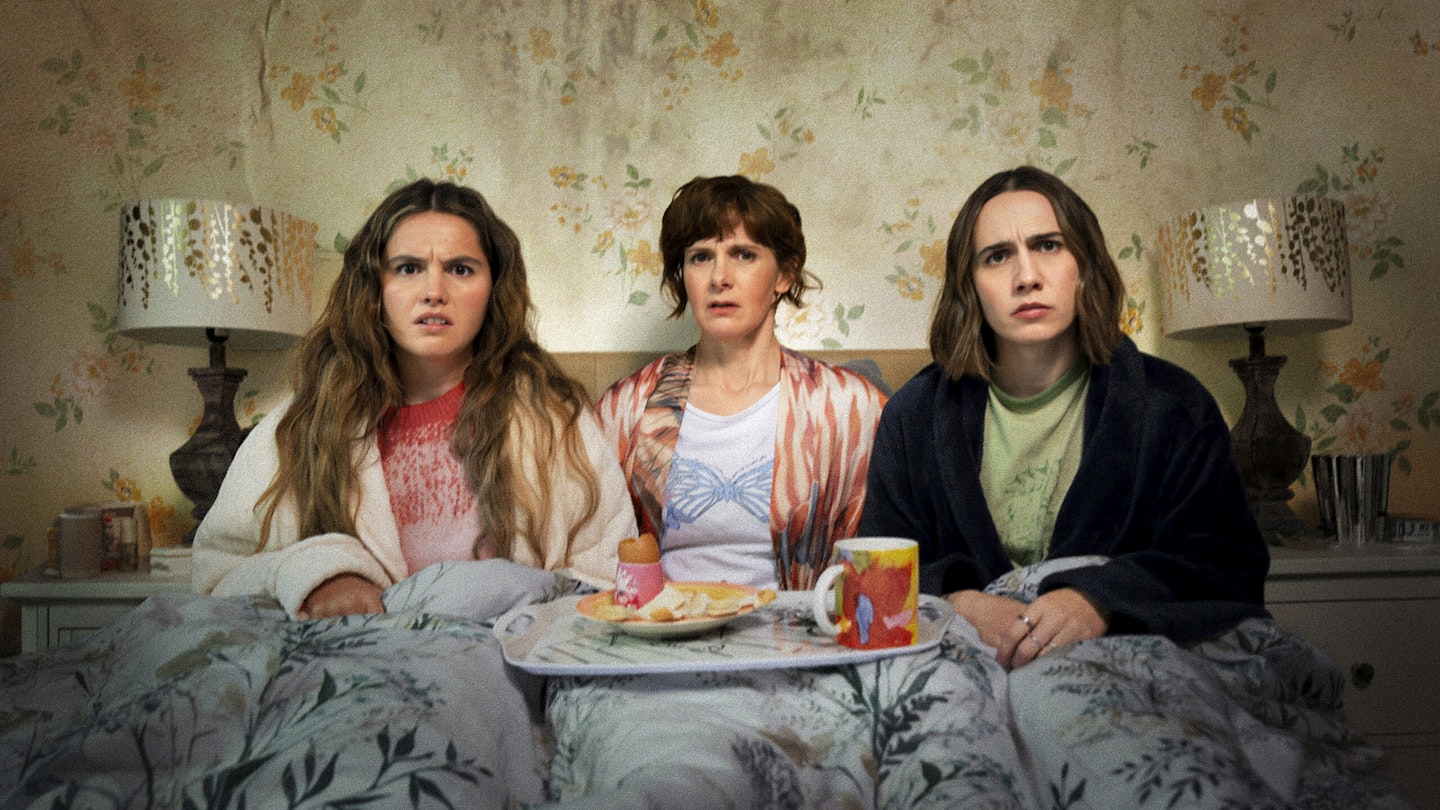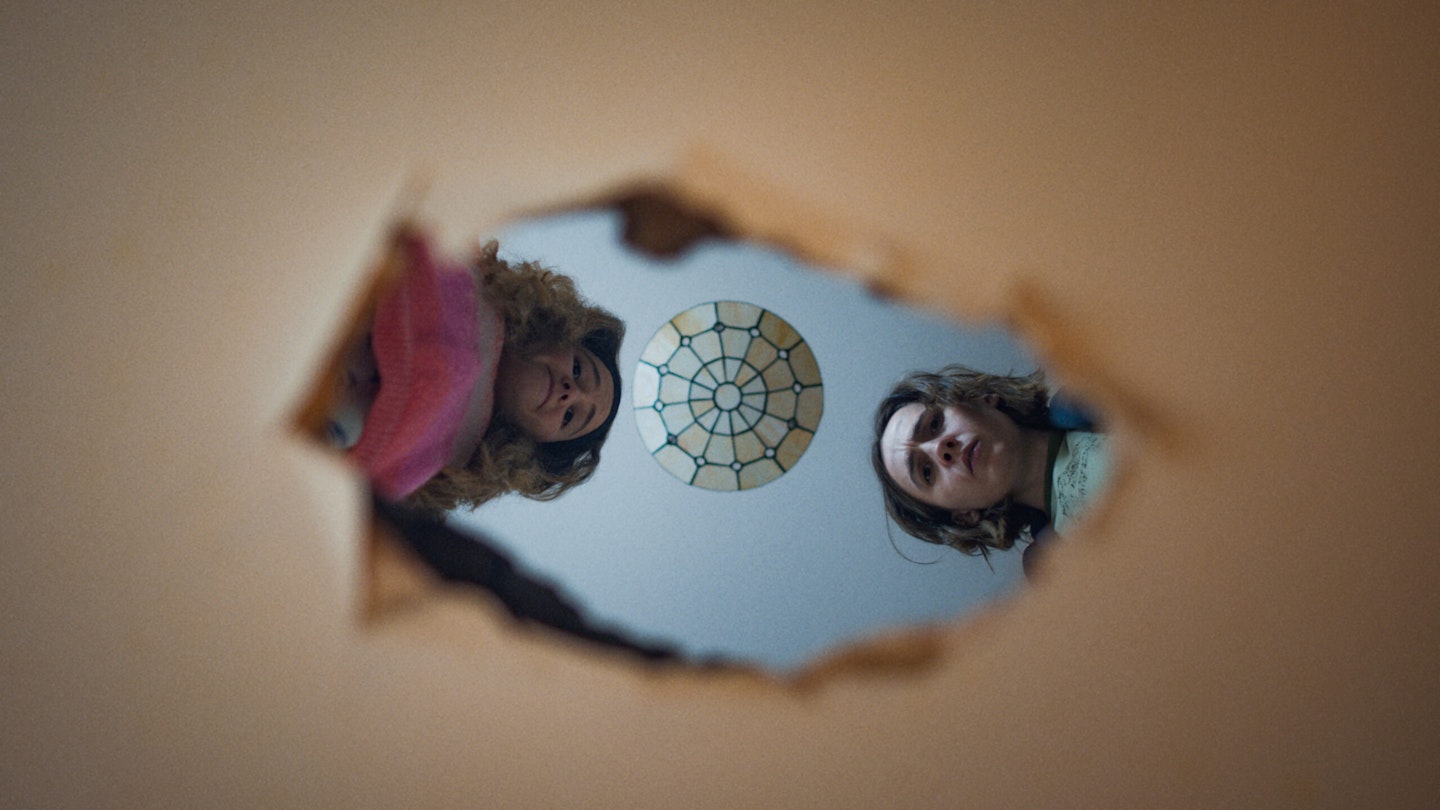Kat Sadler has only been recognised in public three times. The first time was by a man behind the till at H&M, and the second was on New Year's Eve when a drunk girl kindly told her, ‘I loved your show, but my friends couldn’t get through it.’ The third was with her sister, co-star and co-conspirator, Lizzie Davidson, after they wrapped filming for season two of their super-hit, Such Brave Girls, in Liverpool. ‘It was our Christmas Day!’ they tell me in unison.
Given that series one picked up the BAFTA for Scripted Comedy last year, as well as the not-to-be-scoffed-at Craft Award for Emerging Talent: Fiction, their relative anonymity is a surprise. With a belter of a second series out on BBC Three and iPlayer on 3 July, it won’t last much longer either.

Such Brave Girls is a self-described ‘trauma sit-com’, but it passes as a black comedy too. It follows the lives of Josie (Sadler), Billie (Davidson) and their mum Deb (Louise Brealey), a highly dysfunctional trio desperate to find love and financial security. They just can’t seem to do either very successfully. The first series ended with Josie, who is gay, on the phone to a crisis line as she walks through the door to find her on-off schmuck of a boyfriend Seb on one knee asking to marry her. The person on the end of the phone asks, ‘Are you having suicidal thoughts?’, Josie says ‘yes’, and the rest is material for series two.
The truth is Sadler and Davidson (the sisters have different surnames because Kat Sadler is a stage name) are at the helm of one of the most exciting British comedies in years. Never mind the fact it’s ‘female led’ or that it injects comedy into dark themes like depression, abortion and narcissism with aplomb, it’s also just really funny.
Of course, it helps that the sisters are just as funny and dynamic in real life. We meet at a café in Covent Garden to discuss the hotly anticipated second series. Sadler, who wrote and created the show, says Such Brave Girls nearly started out as a drama. ‘I was writing from an authentic place of trauma and part of me thinks I started writing a comedy and then it became a drama. It was like squeezing a spot, I needed to get all the trauma onto the page and turn it into a drama and then take off that layer and be left with a comedy.’
‘You always wanted it to be a sitcom,’ Davidson chimes in. ‘You don’t really see sitcoms anymore. We grew up watching sitcoms and they were always our favourite shows. You can just click onto any episode, and you don’t need to know any context and just have a good, old laugh.’
It’s a job well done then. The first series was met with widespread critical acclaim – including a four-star rave review from The Guardian and a 100% rating on Rotten Tomatoes – even if the sisters haven’t been catapulted into fame just yet.
Part of the show’s success is their fine-tuned understanding of what makes something funny. ‘Our mum is very funny,’ Sadler tells me. ‘She’s very acerbic. I think that’s made us quite sharp with each other.’ Davidson interjects: ‘We’re super rude.’
‘We’re just always taking the piss out of each other,’ the show’s creator goes on. ‘There’s no dignity in the house.’ Something that evidently lends itself to collaborative work. ‘I get the first read which is always amazing,’ says Davidson. ‘We kind of go through every line and I tell her if it’s too smart or too written and we tweak it together.’
‘It’s really frustrating because Lizzie will say something that just unlocks an episode,’ her sister adds. ‘She’ll have the distance to say something and it’s so annoying that I didn’t think of it. They’re always the best things.’

As audiences will see from series two, there is as much comedy in the stage directions as there is in the script. ‘I always think about the crew and everyone who has to read it,’ Sadler explains, ‘it’s not just us acting. I think “what can I give them that’s a bit of fun”.’ From their descriptions of the set, it sounds as though there are definitely worse places to work, especially with The Inbetweeners stalwart Simon Bird on board as director. ‘He’s the loveliest,’ offers Sadler. ‘And he’s a great advocate. He's so aligned with our sense of humour. We really trust him.’
It also helps that they have a formidable ensemble cast, including Benidorm’s Paul Bazley and comic actor Freddie Meredith. ‘We wanted people who weren’t from a comedy background who had just done straight acting because playing it with truth always makes it so much funnier,’ as Davidson puts it. ‘The show is so outlandish and hit or miss, so a straight performance of a funny line feels more real.’
Despite having a comedy giant in the production team and a hit debut series under their belts, Davidson and Sadler are still very much in the throes of imposter syndrome. ‘It was a big risk for Kat to take me on,’ suggests Davidson, who was still working as Princess Fiona at Shrek’s Adventure on London’s Southbank after the first series aired. ‘The BBC must have been like, “she’s not done anything before, that’s your sister, it’s a no.”’
Sadler was working as a standup and comedy writer before the series was greenlit, making her slightly more ‘qualified’ but just as modest. ‘They must have thought that about me!’ she replies. ‘I’d done a bit of standup and was mainly a writer. I’m sure they looked at both of us and were like, “hmm, two newbies who have not done anything before.”’
How, then, did they grab the commissioners’ attention? Just as fans of Josie and Billie’s irreverent humour might expect. They recorded a video of themselves and attached it to their pitch saying, ‘You have to commission it or we’re going to kill ourselves.’ Well, it worked. They went on to shoot a pilot and then the first series, with a second series confirmed shortly after series one hit our screens.
‘You think it’s going to be a champagne pop, we’re going to The Ritz, come on!’ quipped Davidson, ‘but we were completely silent, completely numb [when series two was confirmed].’ For her at least, the shock quickly turned into unadulterated excitement. ‘Anyone who’s coming over, it’s on in the background,’ Davidson beams. Meanwhile Sadler hasn’t watched the show back since the final edit.
There was definitely a case of ‘second album syndrome’ with series two, they both admit. ‘It’s wanting to give people what they’re hoping for but not wanting to try to be outrageous,’ says Sadler. ‘But we pushed it more this series and we’re dealing with some bigger stuff.’
‘Yeah, there’s bigger breakdowns, bigger breakups, bigger boundaries being pushed,’ echoes Davidson. ‘Our tagline for this series is: “Forgive us, please.” Forgive us for what we’re about to say.’
Bigger risks, bigger rewards? I reckon so. Series two is undoubtedly braver and more confident than the first, daring its audience to sit in the discomfort, lean in and laugh. My advice to the sisters, not that they need it, is to go to a shopping centre and go up and down the escalator as many times as they can. They won’t be able to unrecognised for much longer.
Such Brave Girls series two is available to watch on BBC Three and BBC iPlayer from 3 July.
Nikki Peach is a writer at Grazia UK, working across entertainment, TV and news. She has also written for the i, i-D and the New Statesman Media Group and covers all things pop culture for Grazia (treating high and lowbrow with equal respect).
